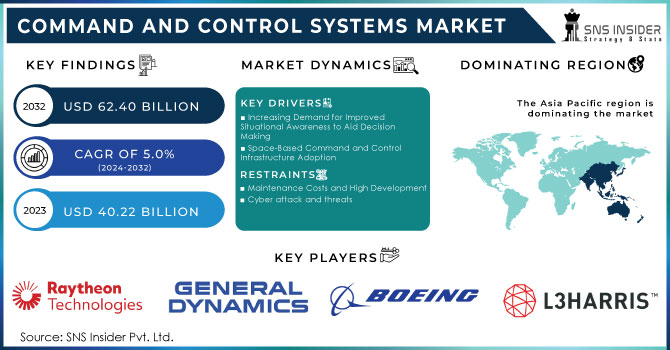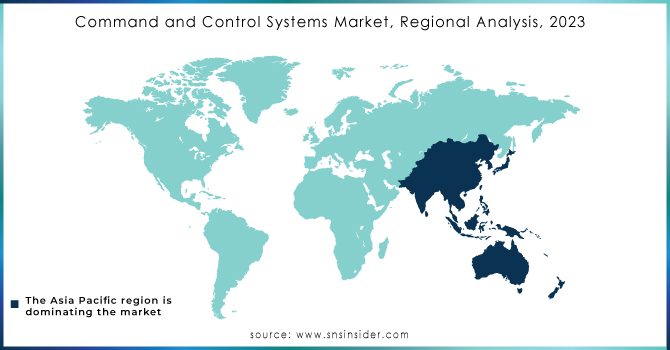Command and Control Systems Market Report Scope & Overview:

To get more information on Command and Control Systems Market - Request Free Sample Report
The Command and Control Systems Market Size was valued at USD 40.22 billion in 2023 and is expected to reach USD 62.40 billion by 2032 with a growing CAGR of 5.0% over the forecast period 2024-2032.
The Command and Control System refers to the structures, infrastructure, equipment, and processes that are critical to the commander-in-chief of planning, management, and control. The people, information, and support network of control and control systems, such as software, computer systems, and applications, are important components of the command and control system. It gives the commander complete, accurate, continuous, and real-time data, allowing him to decide what to do and to take appropriate action. Command and control systems assist organizations or managers on the battlefield in successfully planning and achieving strategic goals. Command and control system set of resources, equipment, communications, processes, and hardware needed to carry out military operations.
Creating ideas, using energy, allocating resources, and directing are all part of the task. It assists military organizations in organizing, directing, and controlling units assigned to tasks while also improving individual performance. Automated combat systems are used in a complex environment with many threats because they allow modern warfare to deal with a large number of targets and short response times. The need for awareness of the situation in military and legal institutions is growing as political tensions between countries intensify. One of the major causes of the need for control and tracking systems for tracking warships, aircraft, and missiles is this. Landscape satellites are also used for communication, data collection, and processing, as well as for detection and warning. It can also link support weapons, control aircraft, and fire control weapon systems, among other procedural and technical functions.
MARKET DYNAMICS
KEY DRIVERS
-
Increasing Demand for Improved Situational Awareness to Aid Decision Making
-
Space-Based Command and Control Infrastructure Adoption
RESTRAINTS
-
Maintenance Costs and High Development
-
Cyber attack and threats
OPPORTUNITIES
-
In the transportation, healthcare, and law enforcement sectors, there is a high demand for integrated command and control systems.
-
Integration of Geo-spatial Analytical Tools from Satellites with C2 Systems
CHALLENGES
-
Data Storage and Analysis Challenges
-
Reduced military expenditure in developed countries
THE IMPACT OF COVID-19
Due to a government-imposed lockdown in the aftermath of the COVID-19 pandemic, command and control system manufacturers are forced to shut down production operations.
Lockdown has a negative impact on command and control systems because of the high maintenance requirements of command and control systems and their subsystems.
All ongoing projects of command and control system installation and deployment have been delayed due to supply chain disruption caused by government initiatives to slow the spread of COVID-19.
Because of travel bans imposed by authorities to control the COVID-19 outbreak, command and control systems are experiencing short-term operational issues.
Over the forecast period, the defence segment is expected to hold the largest market share because these systems enable users to make accurate decisions for completing mission-critical operations. Real-time data is critical in mission-critical situations because it provides precise and up-to-date information about battlefield conditions and is thus widely used by defence agencies.
The commercial segment is expected to grow at the fastest CAGR during the forecast period due to an increasing demand for situational awareness in various industrial operations such as manufacturing and transportation. Manufacturing, oil and gas, transportation, and utilities are among the industries that have embraced the systems. C2 solutions are tailored to each client's specific industrial needs in order to effectively manage critical operations.
C2 systems are used in mission-critical land, naval, space, and airborne operations. They are intended to meet the specific needs of defence forces in battlefield operations, as well as the needs of commercial industries in mission-critical operations. These systems enable effective mission planning, critical decision-making, and successful plan execution, as well as situational awareness, which is a critical factor for success in land, naval, space, or airborne missions.
The maritime segment is expected to grow the most during the forecast period, owing to increased investment in naval development activities and an increase in marine trade activities that necessitate complete control over critical shipping activities.
Based on the solutions. The market for command and control systems is divided into three segments: hardware, software, and services. Because of the extensive use of sensors, displays and peripherals, video walls, video screens, radar systems, and other hardware in control room centre, hardware held the largest market share. Over the forecast period, the software segment is expected to grow at the fastest CAGR. The market is divided into advanced camera control software, cyber security software, perimeter intrusion detection software, and physical security information management software. The software allows intelligent sensors, GPS, and other hardware used in command centre to function properly. In the near future, the increasing use of intelligent software in command centre is expected to drive segment growth.
KEY MARKET SEGMENTATION
By Application
-
Government & Defense
-
Commercial
By Platform
-
Land
-
Airborne
-
Maritime
-
Space
By Installation Type
-
New Installation
-
Upgradation
By Installation Base
-
Fixed Command Center
-
Deployable Command Center
By Solution
-
Software
-
Hardware
-
Services
REGIONAL ANALYSIS
Based on regional analysis, the Global Command And Control System Market are classified into North America, Europe, Asia Pacific, and the Rest of the world. Asia Pacific is expected to be the fastest growing regional market due to rising geopolitical conflicts and military spending on the next generation of communication operations. Geopolitical disputes in Asian countries such as India, China, and Pakistan, as well as multinational military procedures used by Middle Eastern armed forces, are expected to drive demand for C2 systems because they improve the efficiency of military operations.

Need any customization research on Command and Control Systems Market - Enquiry Now
REGIONAL COVERAGE:
-
North America
-
USA
-
Canada
-
Mexico
-
-
Europe
-
Germany
-
UK
-
France
-
Italy
-
Spain
-
The Netherlands
-
Rest of Europe
-
-
Asia-Pacific
-
Japan
-
south Korea
-
China
-
India
-
Australia
-
Rest of Asia-Pacific
-
-
The Middle East & Africa
-
Israel
-
UAE
-
South Africa
-
Rest of Middle East & Africa
-
-
Latin America
-
Brazil
-
Argentina
-
Rest of Latin America
-
KEY PLAYERS
The Major Players are Raytheon Company, General Dynamics Corporation, Lockheed Martin Corporation, The Boeing Company, L3 Harris Technologies, Saab AB, Thales Group, Siemens AG, Northrop Grumman Corporation., Leonardo SPA., and other players
| Report Attributes | Details |
|---|---|
| Market Size in 2023 | USD40.22 Billion |
| Market Size by 2032 | USD 62.40 Billion |
| CAGR | CAGR of 5% From 2024 to 2032 |
| Base Year | 2023 |
| Forecast Period | 2024-2032 |
| Historical Data | 2020-2022 |
| Report Scope & Coverage | Market Size, Segments Analysis, Competitive Landscape, Regional Analysis, DROC & SWOT Analysis, Forecast Outlook |
| Key Segments | • By Application (Government & Defense, and Commercial) • By Platform (Land, Airborne, Maritime, and Space) • By Installation Type (New Installation and Upgradation) • By Installation Base (Fixed Command Center and Deployable Command Center) • By Solution (Software, Hardware and Services) |
| Regional Analysis/Coverage | North America (USA, Canada, Mexico), Europe (Germany, UK, France, Italy, Spain, Netherlands, Rest of Europe), Asia-Pacific (Japan, South Korea, China, India, Australia, Rest of Asia-Pacific), The Middle East & Africa (Israel, UAE, South Africa, Rest of Middle East & Africa), Latin America (Brazil, Argentina, Rest of Latin America) |
| Company Profiles | Raytheon Company, General Dynamics Corporation, Lockheed Martin Corporation, The Boeing Company, L3Harris, Saab AB, and Thales Group, Siemens AG, Northrop Grumman Corporation., Leonardo SPA., and other players. |
| DRIVERS | • Increasing Demand for Improved Situational Awareness to Aid Decision Making • Space-Based Command and Control Infrastructure Adoption |
| RESTRAINTS | • Maintenance Costs and High Development • Cyber attack and threats |

